Warning Letter To Employee For Not Responding
[Your Name]
[Your Title/Position]
[Company Name]
[Company Address]
[City, State, Zip Code]
[Date]
[Employee's Name]
[Employee's Position]
[Department/Area]
[Company Address]
[City, State, Zip Code]
Subject: Warning Letter for Failure to Respond to Communication
Dear [Employee's Name],
I hope this letter finds you well. I am writing to address a concerning matter regarding your responsiveness to communication within the company. As you are aware, effective communication is essential for the smooth functioning of any organization, and it is crucial for all employees to promptly respond to emails, calls, and other forms of communication from colleagues, supervisors, or management.
Regrettably, it has come to my attention that you have not been responding to important communications within a reasonable time frame. This lack of response can have serious implications for the workflow, productivity, and overall performance of the team and the company.
Examples of instances where your lack of response has been observed include:
[Here, mention specific instances where the employee failed to respond to important communications, if possible.]
This behavior is not aligned with our company's values and expectations. It is imperative for all employees to demonstrate professionalism and accountability by promptly attending to their communications, both internally and externally.
As a responsible employer, we expect our employees to uphold a high standard of communication etiquette. Your failure to respond timely reflects poorly on your commitment to your role and your colleagues. It also disrupts the efficient functioning of the team and undermines the trust that others place in your ability to deliver on your responsibilities.
In light of the above, this letter serves as a formal warning. We expect immediate improvement in your responsiveness to all communication going forward. Failure to do so may lead to further disciplinary action, up to and including termination of your employment with the company.
To prevent any future miscommunication or confusion, please ensure that you do the following:
1. Check your email regularly and respond to important messages promptly.
2. Keep your phone accessible and respond to calls or messages from colleagues or management in a timely manner.
3. Communicate proactively if you anticipate any challenges in responding promptly.
I would like to reiterate that we value your contribution to the company and hope that this warning will serve as a wake-up call for you to address this issue promptly. Should you have any concerns or difficulties that may be affecting your ability to respond to communication, I encourage you to discuss them with your immediate supervisor or the HR department.
Please sign below to acknowledge that you have received this warning letter and understand the importance of improving your responsiveness.
------------------------
[Employee's Signature]
Date: [Date of Signing]
Please be advised that a copy of this warning letter will be placed in your personnel file for future reference.
We trust that you will take this matter seriously and work towards improving your communication habits. Your cooperation in this regard is expected.
Sincerely,
[Your Name]
[Your Title/Position]
[Company Name]
Formal Warning Letter for Not Responding to Official Communication
Subject: Warning for Failure to Respond to Official Communication
Dear [Employee Name],
This letter serves as a formal warning regarding your consistent failure to respond to official communications from your supervisor and management team. Despite multiple reminders through email and internal channels, we have not received any response from you on key matters related to your duties and deadlines.
Effective communication is a fundamental expectation of your role. Your lack of response has delayed important processes and impacted team coordination. We expect immediate improvement in your communication practices and responsiveness.
Please treat this as a written warning. Continued negligence in this regard may lead to disciplinary action, including suspension or termination. Kindly acknowledge receipt of this letter and confirm your commitment to improve communication standards moving forward.
Sincerely,
[Your Name]
[Your Position]
Casual Internal Email Warning for Not Replying
Subject: Quick Note – Please Respond to Team Emails
Hi [Employee Name],
I hope you’re doing well. I wanted to bring to your attention that a few of our recent emails have gone unanswered, particularly those concerning [specific project/task]. Timely communication helps us keep things running smoothly as a team.
Please make it a priority to check and respond to your messages regularly. If there’s any reason you’ve been unable to, feel free to let me know. We just want to make sure nothing falls through the cracks.
Thanks for understanding, and I look forward to your reply.
Best,
[Your Name]
Serious Warning Letter for Ignoring Management Messages
Subject: Final Warning – Failure to Respond to Management Communication
Dear [Employee Name],
This is a final written warning regarding your continued failure to respond to official communication from your superiors. Despite multiple reminders and a prior warning, your pattern of ignoring emails and messages persists.
Such behavior demonstrates a lack of professionalism and accountability, which cannot be tolerated. Please be advised that if this issue continues, the company will have no choice but to initiate disciplinary action, which may include termination of employment.
We expect you to respond promptly to all official communications going forward. Kindly acknowledge this letter immediately upon receipt.
Sincerely,
[Your Name]
[Your Position]
Warning Email for Not Responding to Client Queries
Subject: Urgent – Lack of Response to Client Inquiries
Dear [Employee Name],
It has come to our attention that several client inquiries sent to you have remained unanswered for an extended period. This lack of communication reflects poorly on our organization and may affect our client relationships.
As part of your role, prompt and courteous client communication is essential. Failure to respond or acknowledge messages in a timely manner is unacceptable and will not be tolerated.
Please treat this as an official warning. We expect you to address all pending client communications immediately and maintain proper communication protocols henceforth.
Sincerely,
[Your Name]
[Department/Company Name]
Preliminary Warning Message for Not Responding to Supervisor
Subject: Reminder to Stay Responsive to Supervisor Communications
Dear [Employee Name],
This is a preliminary reminder regarding the recent lack of response to communications from your supervisor. We understand that workload and scheduling can be demanding, but it’s important to acknowledge messages to ensure workflow continuity.
Please make it a practice to respond to all official messages within [X hours/days], even if it’s just to confirm receipt. Doing so helps maintain efficiency and demonstrates professionalism.
We hope this issue will be corrected immediately without the need for further action.
Best regards,
[Your Name]
Official Warning Letter for Ignoring Repeated Follow-ups
Subject: Warning for Ignoring Multiple Follow-Ups
Dear [Employee Name],
This letter serves as an official warning regarding your failure to respond to multiple follow-up communications concerning [specific matter]. Despite reminders on [list dates], we have not received a response or acknowledgment from you.
Timely communication is an essential aspect of your responsibilities. Your continued lack of response affects departmental coordination and workflow efficiency.
You are hereby advised to respond promptly to all communications and ensure this behavior does not recur. Further incidents of this nature will lead to disciplinary review.
Sincerely,
[Your Name]
[Your Position]
Simple Warning Message for Ignoring Work Group Chats
Subject: Please Stay Active in Team Communication Channels
Hi [Employee Name],
We’ve noticed you haven’t been responding to messages in our work group chat. Your input is valuable, and your silence makes it difficult for the team to coordinate effectively.
Please check and respond to group messages regularly, especially during project hours. Consistent communication keeps everyone aligned and helps us meet our deadlines.
Let’s get back on track with better engagement. Thank you!
Best,
[Your Name]
Warning Email for Ignoring HR Communication
Subject: Warning for Non-Response to HR Communication
Dear [Employee Name],
The HR Department has attempted to reach you several times regarding [specific issue: attendance update, policy acknowledgment, etc.], but no response has been received to date.
It is crucial for all employees to respond to HR communications promptly, as these messages often involve compliance and organizational policy matters. Non-responsiveness is a breach of company policy.
Please treat this as a written warning and respond to the pending communication immediately to avoid escalation.
Sincerely,
[HR Manager’s Name]
[HR Department]
What is a Warning Letter to an Employee for Not Responding and Why It Is Important
A warning letter to an employee for not responding is a formal document issued to address communication negligence. It highlights instances where the employee failed to reply to messages, emails, or instructions from management or clients. The goal is to correct the behavior, reinforce accountability, and maintain workflow efficiency. Timely warnings prevent escalation and encourage better communication habits.
Who Should Issue the Warning Letter
These letters are typically sent by:
- Immediate supervisors or team leaders.
- Department heads or managers.
- HR managers when non-responsiveness affects policy compliance. The sender should hold a position with the authority to evaluate and address employee behavior.
Whom Should the Letter Be Addressed To
The letter is addressed to the employee who has failed to respond to official communications. It may apply to employees who:
- Ignore supervisor or HR messages.
- Fail to reply to clients or partners.
- Avoid responding to team communication channels.
- Regularly neglect official emails or requests for confirmation.
When Should You Send a Warning Letter for Non-Responsiveness
Send the letter when:
- An employee fails to reply after several reminders.
- Delays in response affect projects or client relations.
- HR notices missing responses to mandatory communications.
- The employee repeatedly ignores messages despite verbal reminders.
How to Write a Warning Letter to an Employee for Not Responding
- Start with the purpose of the letter – addressing communication failure.
- Provide examples of unresponsiveness (dates, types of messages, etc.).
- Explain the impact on workflow or company performance.
- State expected corrective behavior.
- Mention potential disciplinary consequences.
- End by encouraging improvement and acknowledgment of the warning.
Formatting and Tone Guidelines
- Use a formal and respectful tone for official warnings.
- Keep the letter concise, ideally within one page.
- Be specific about incidents without being overly harsh.
- Emails can use a slightly conversational tone for preliminary warnings.
- Printed letters are best for formal or final warnings.
Requirements and Preparations Before Sending
- Confirm that the employee indeed failed to respond.
- Review previous reminders and documentation.
- Discuss the issue with HR before issuing a written warning.
- Ensure consistency with company disciplinary policy.
- Keep a copy of the letter for employee records.
After Sending: Follow-Up Steps
- Request acknowledgment from the employee.
- Monitor communication patterns after the warning.
- Conduct a follow-up discussion if no improvement occurs.
- Escalate to disciplinary action if the issue persists.
- Record the incident in the employee’s performance file.
Common Mistakes to Avoid
- Sending a harsh letter without prior discussion.
- Failing to document earlier reminders.
- Making the tone personal or emotional.
- Not providing clear next steps for correction.
- Forgetting to request acknowledgment of the letter.
Key Elements and Structure of the Letter
- Subject line: Clearly states the issue (e.g., “Warning for Failure to Respond”).
- Opening paragraph: Mentions the purpose of the letter.
- Body: Explains instances and effects of non-response.
- Conclusion: States corrective actions and possible consequences.
- Signature: Includes the sender’s name, title, and department.
Pros and Cons of Sending a Warning Letter
Pros:
- Reinforces communication discipline.
- Provides documentation for HR records.
- Encourages immediate behavioral correction.
Cons:
- May affect employee morale if phrased too harshly.
- Could create tension if not properly justified.
Tricks and Tips for Writing Effective Warning Letters
- Maintain a professional yet calm tone.
- Always include specific examples of unresponsiveness.
- Offer the employee a chance to explain before finalizing.
- End with a constructive note encouraging improvement.
- Send through official communication channels only.

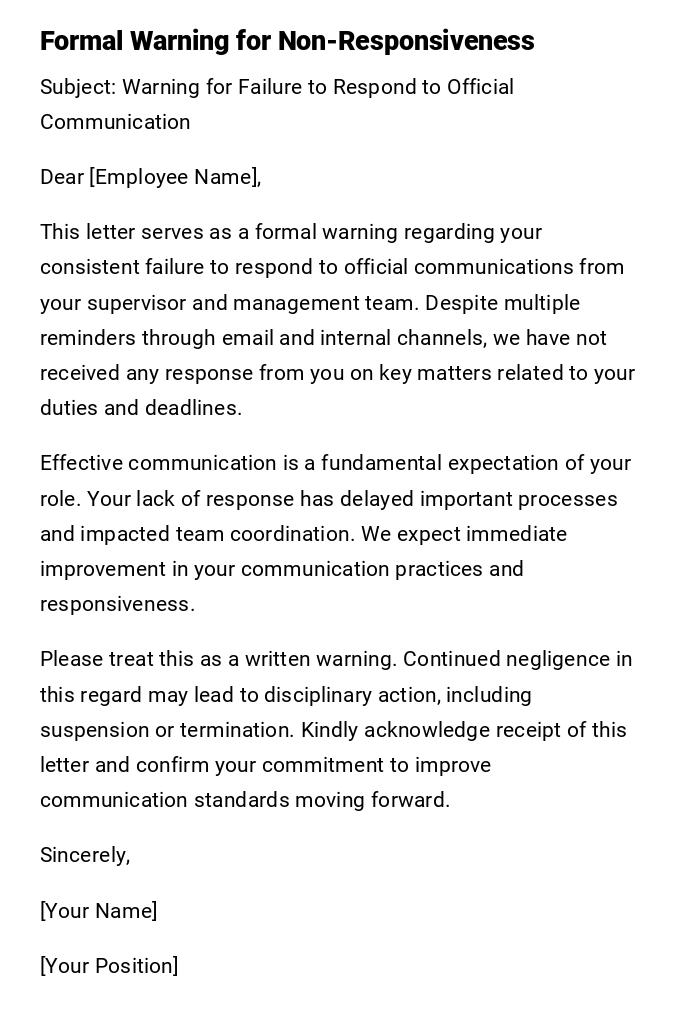
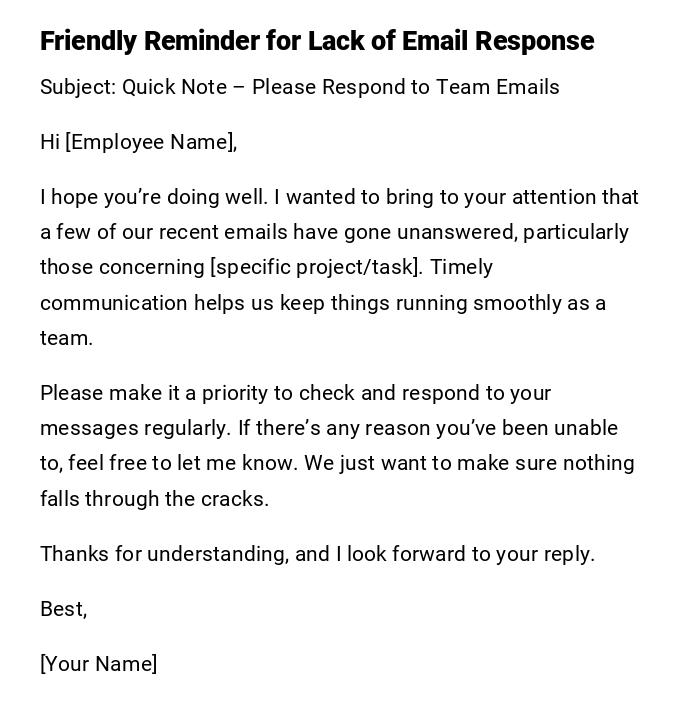
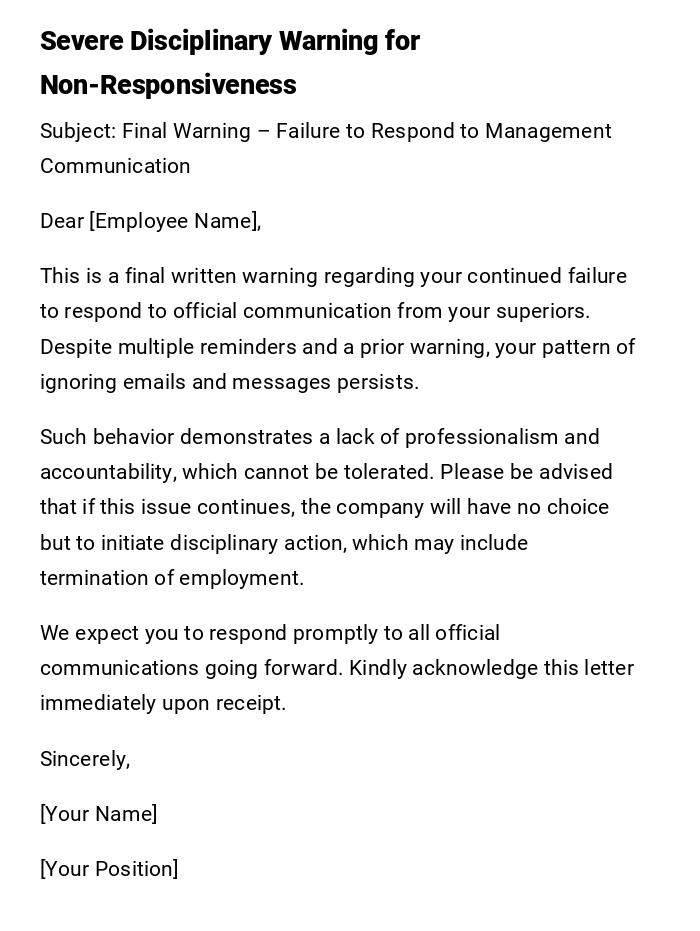
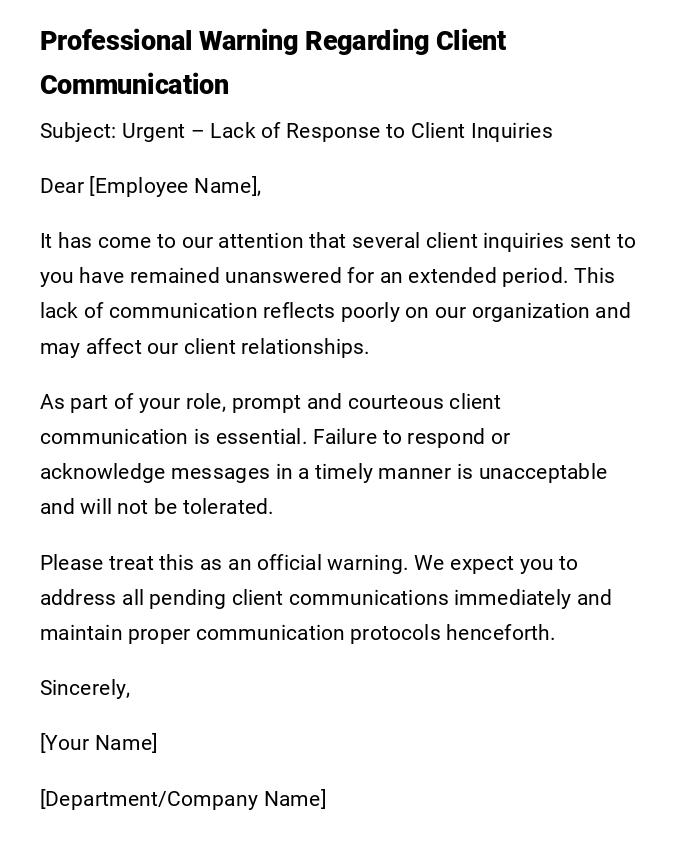
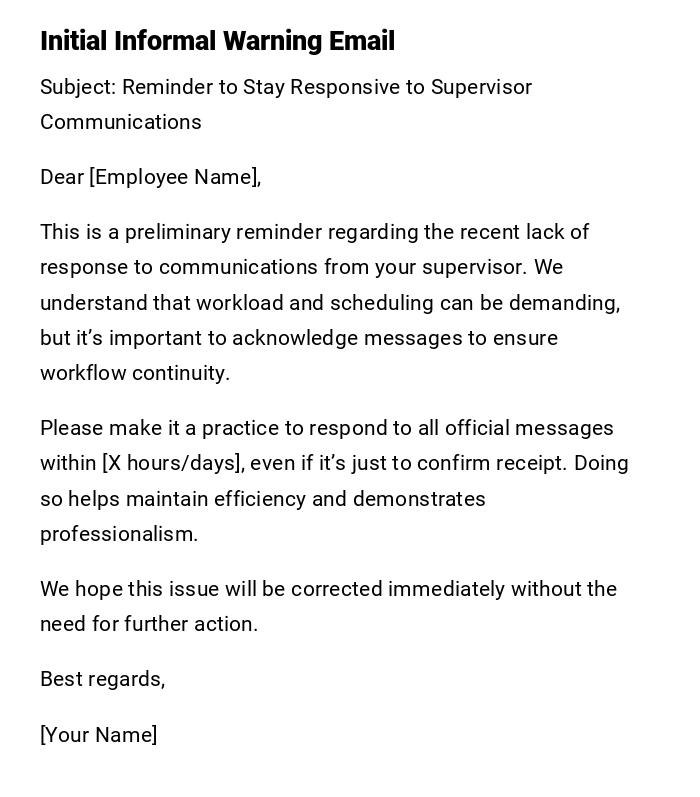
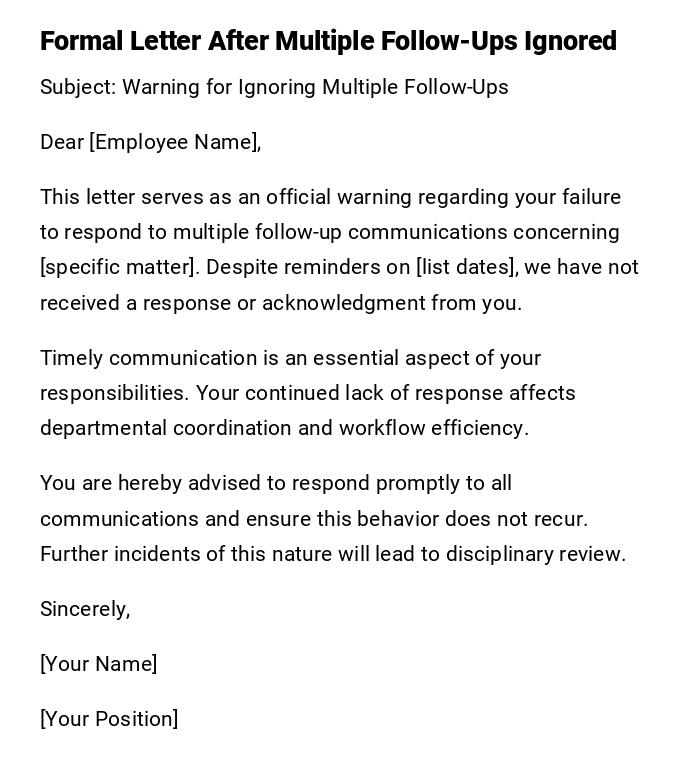
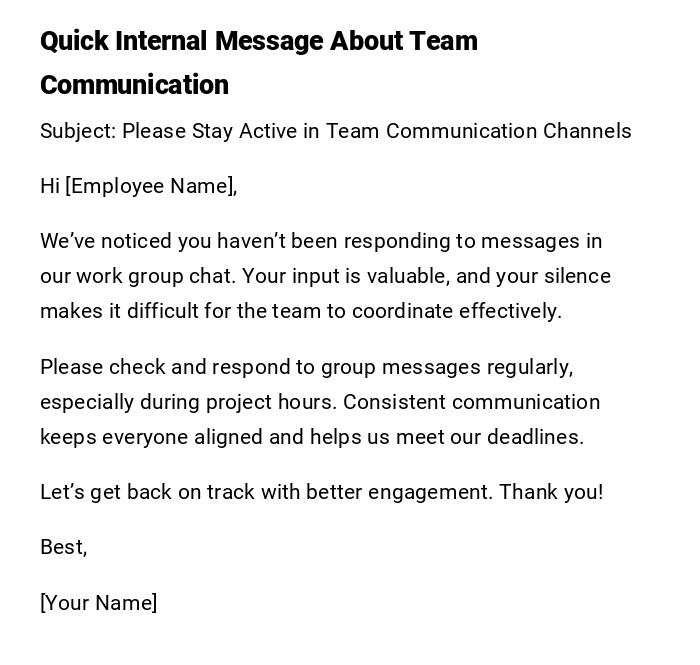
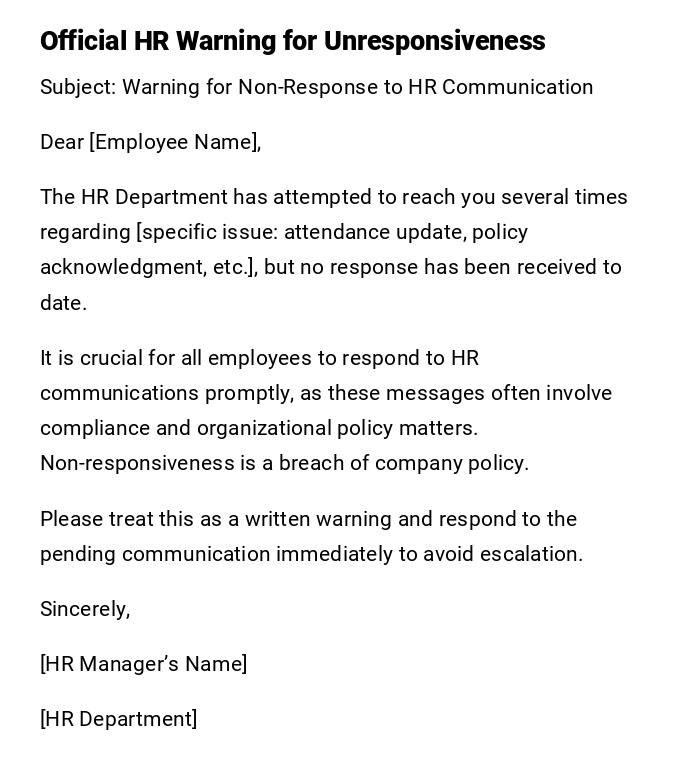

 Download Word Doc
Download Word Doc
 Download PDF
Download PDF